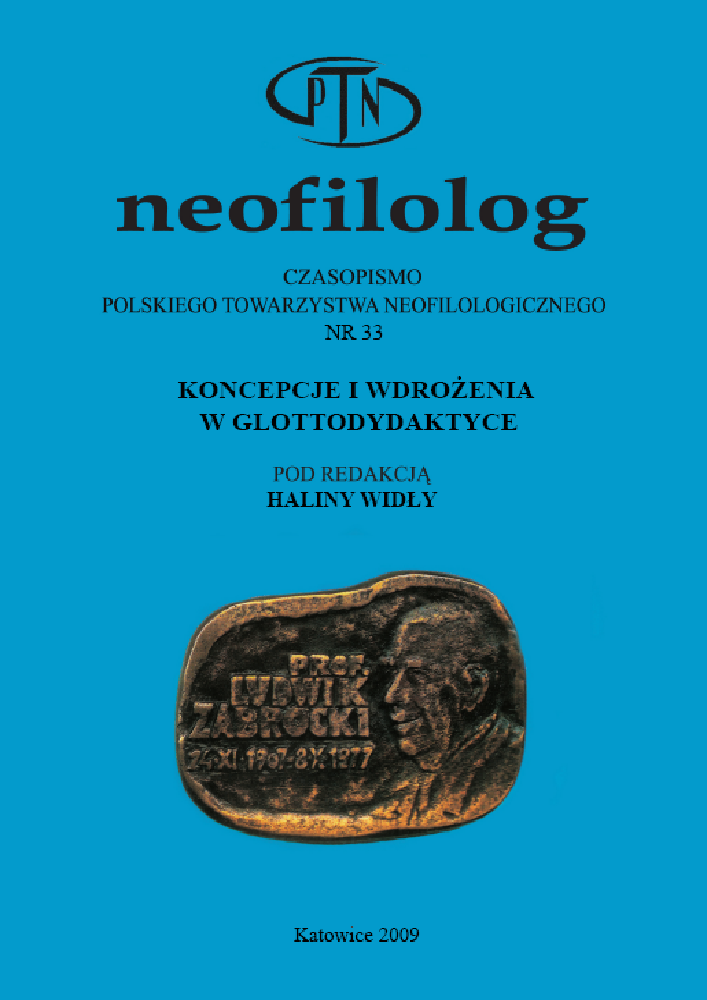Abstrakt
The article aims at presenting the technique of critical incidents analysis as a tool to promote reflectivity among inexperienced foreign language teachers. Critical incidents, often used in social and educational studies, are defined as meaningful and important situations (both positive and negative) that trigger individual’s reflection and help him/her realize his/her beliefs and practices. The article provides characteristics of the technique of critical incidents analysis. Data gathered from inexperienced student teachers (n= 30) indicate strong emotional involvement of the subjects in the study . Their descriptions of critical incidents concentrated mostly on negative situations resulting from their lack of experience with classroom routines, low self-confidence and feelings of inadequacy.
„Nauczanie to uczestniczenie w powodzi zdarzeń”
(Tripp 1993; Kwiatkowska 2008: 173)
Bibliografia
Arends, R. I. 1994. Uczymy się nauczać. Tłum. K. Kruszewski. Warszawa: WSiP.
Day, Ch. 1999. Rozwój zawodowy nauczyciela. Przeł. J. Michalak. Gdańsk: Gdańskie Wydawnictwo Psychologiczne.
Flyvbjerg, B. 2005. „Pięć mitów o badaniach typu studium przypadku”. Studia Socjologiczne 2005, 2(177) ISSN 0039-3371, str. 41 – 69
Head, K. i P. Taylor.1997. Readings in Teacher Development. Oxford: Macmillan Education.
James, P. 2001. Teachers in Action. Tasks for In- service Language Teacher Education and Development. Cambridge: Cambridge University Press.
Kwiatkowska, H. 2008. Pedeutologia. Warszawa: Wydawnictwa Akademickie i Profesjonalne.
Mann, S. 2005. “The language teacher’s development”. Language Teaching 38, 103 – 118
Randall, M. i B. Thornton. 2001. Advising and Supporting Teachers. Cambridge: Cambridge University Press.
Richards, J. C. i T. S. C. Farrell. 2005. Professional Development for Language Teachers. Cambridge: Cambridge University Press
Richards, J. C. i C. Lockhart. 1996. Reflective Teaching in Second Language Classrooms. Cambridge: Cambridge University Press.
Rollett, B. A. 2001. “How do expert teachers view themselves?”. (w) Early Professional Development for Teachers (red. Banks, F. i Shelton Mayes, A.). London: The Open University, str. 27 – 40.
Tripp, D. 1993. Critical Incidents in Teaching. Developing Professional Judgement. London: Routledge.
Tsui, A. B. 2007. “Complexities of Identity Formation: A Narrative Inquiry of an EFL Teacher”. TESOL Quaterly, vo. 41, No. 4. December 2007, str. 657 – 680.
Licencja
Prawa autorskie (c) 1970 Grażyna Kiliańska-Przybyło

Utwór dostępny jest na licencji Creative Commons Uznanie autorstwa – Bez utworów zależnych 4.0 Międzynarodowe.
Przedstawiany utwór (artykuł) upubliczniany jest na podstawie umowy z autorem i na licencji Creative Commons Attribution-NoDerivatives 4.0 International (CC BY-ND 4.0).
Użytkownicy mają obowiązek podania wraz z rozpowszechnionym utworem, informacji o autorstwie, tytule, źródle (odnośniki do oryginalnego utworu, DOI) oraz samej licencji;
- bez tworzenia utworów zależnych,
- utwór musi być zachowany w oryginalnej postaci.
Uniwersytet im. Adama Mickiewicza w Poznaniu zachowuje prawo do czasopisma jako całości (układ, forma graficzna, tytuł, projekt okładki, logo itp.).
